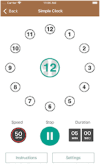The "FitBrain" program: implementing exergaming & dual-task exercise programs in outpatient clinical settings
- PMID: 39712081
- PMCID: PMC11658983
- DOI: 10.3389/fspor.2024.1449699
The "FitBrain" program: implementing exergaming & dual-task exercise programs in outpatient clinical settings
Abstract
Dual-task training and exergaming interventions are increasingly recognized for their potential to enhance cognitive, physical, and mood outcomes among older adults and individuals with neurological conditions. Despite this, clinical and community programs that use these interventions are limited in availability. This paper presents the "FitBrain" program, an outpatient clinical model that combines dual-task and exergaming interventions to promote cognitive and physical health. We review the scientific rationale supporting these methods, detail the structure and methodology of the FitBrain program, and provide examples of session designs that integrate dual-tasking through exergaming. The paper also addresses implementation considerations, such as tailoring interventions to specific populations, ensuring user-centered design, and leveraging accessible technologies. We discuss key challenges, including limited research on programs utilizing multiple technologies and cost constraints, and propose directions for future research to refine best practices and evaluate the comparative effectiveness of multimodal vs. singular interventions. This paper aims to inform clinicians and program developers on implementing dual-task and exergaming interventions within diverse clinical and community settings by offering a structured model and practical guidelines.
Keywords: cognitive-motor dual-tasking; cognitive-motor training; dual-task; exergaming; neurological; older adults; rehabilitation; serious games.
© 2024 Glatt, Patis, Miller, Merrill, Stubbs, Adcock, Giannouli and Siddarth.
Conflict of interest statement
RG acts as a consultant and advisor for multiple companies mentioned in this article. The relevant companies have provided some of the equipment mentioned in this paper in-kind. The remaining authors declare that the research was conducted in the absence of any commercial or financial relationships that could be construed as a potential conflict of interest.
Figures
















Similar articles
-
Effects of Motor-Cognitive Dual-Task Standing Balance Exergaming Training on Healthy Older Adults' Standing Balance and Walking Performance.Games Health J. 2023 Aug;12(4):302-309. doi: 10.1089/g4h.2022.0203. Epub 2023 Mar 21. Games Health J. 2023. PMID: 36944151
-
The future of Cochrane Neonatal.Early Hum Dev. 2020 Nov;150:105191. doi: 10.1016/j.earlhumdev.2020.105191. Epub 2020 Sep 12. Early Hum Dev. 2020. PMID: 33036834
-
Challenges and suggestions for exergaming program in exercise among older adults.Zhong Nan Da Xue Xue Bao Yi Xue Ban. 2023 Oct 28;48(10):1621-1628. doi: 10.11817/j.issn.1672-7347.2023.230149. Zhong Nan Da Xue Xue Bao Yi Xue Ban. 2023. PMID: 38432891 Free PMC article. Chinese, English.
-
Effects of Exergaming on Physical and Cognitive Functions in Individuals with Autism Spectrum Disorder: A Systematic Review.Games Health J. 2019 Apr;8(2):74-84. doi: 10.1089/g4h.2018.0032. Epub 2018 Oct 17. Games Health J. 2019. PMID: 30332294
-
Exergaming to Increase Physical Activity in Older Adults: Feasibility and Practical Implications.Curr Heart Fail Rep. 2024 Aug;21(4):439-459. doi: 10.1007/s11897-024-00675-9. Epub 2024 Jul 18. Curr Heart Fail Rep. 2024. PMID: 39023808 Free PMC article. Review.
References
-
- Demurtas J, Schoene D, Torbahn G, Marengoni A, Grande G, Kelaiditi E, et al. Physical activity and exercise in mild cognitive impairment and dementia: an umbrella review of intervention and observational studies. J Am Med Dir Assoc. (2020) 21(10):1415–1422.e6. 10.1016/j.jamda.2020.08.031 - DOI - PubMed
LinkOut - more resources
Full Text Sources
Medical

